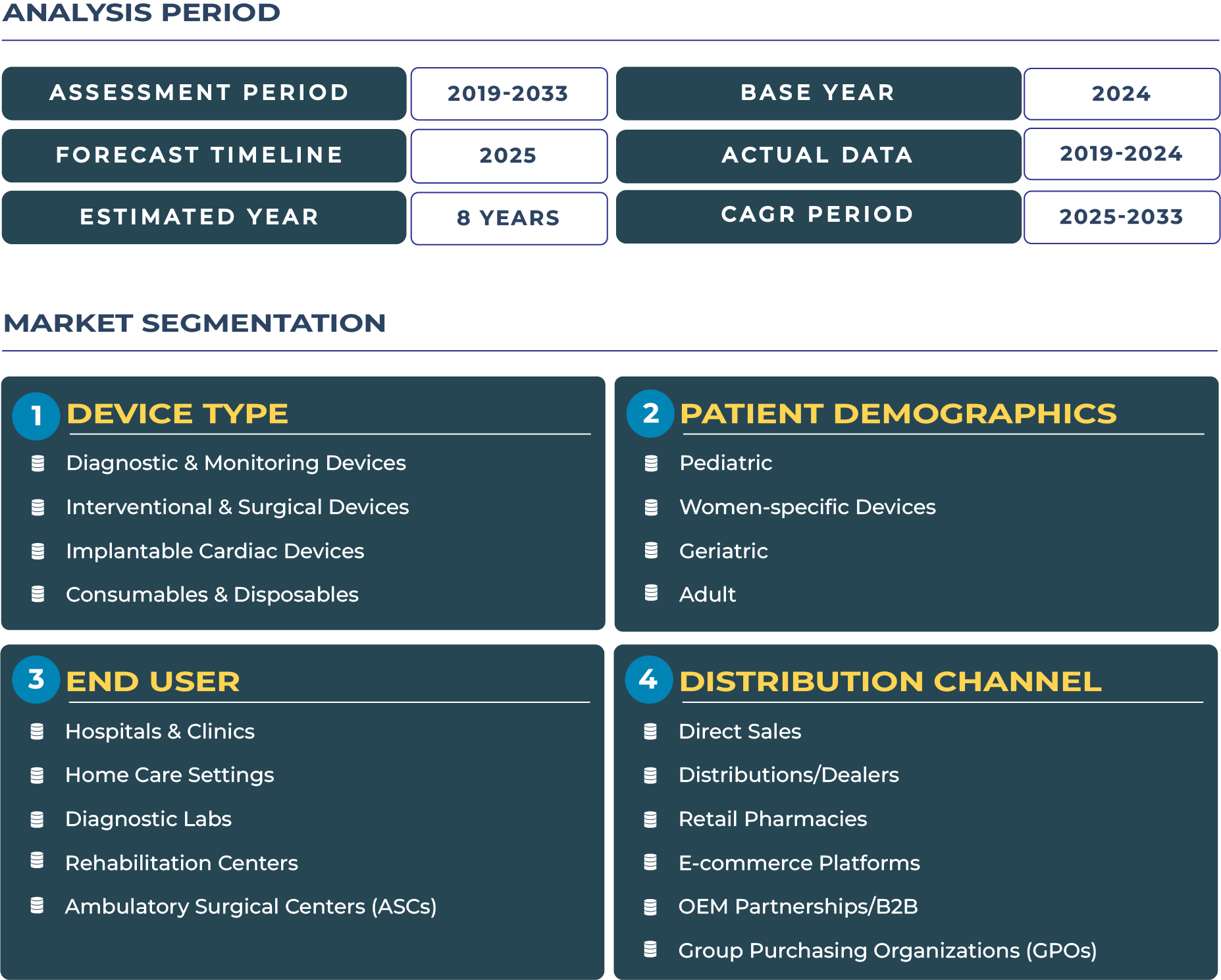Bahrain Cardiovascular Devices Market Outlook: Service-Centric Growth in a Small but Strategic Healthcare Economy
The Bahrain Cardiovascular Devices Market is positioned as a small but resilient healthcare economy. Valued at USD 73.3 million in 2025, it is projected to reach USD 87.6 million by 2033 at a CAGR of 2.3%. Market stability is driven by high per-capita healthcare spending, public hospital modernization, and the growing participation of private hospitals. While limited in scale, Bahrain’s cardiovascular devices industry benefits from its positioning as a service hub within the Gulf, emphasizing after-sales contracts, consumables supply, and maintenance-heavy adoption. Growth is steady, reflecting its dependence on sustainable procurement models and regional healthcare integration.
How Bahrain’s Service-Driven Healthcare Model Shapes the Future of Cardiovascular Devices
Bahrain presents a distinctive cardiovascular devices market defined by its small population, high per-capita healthcare spending, and strong reliance on service-driven strategies. Unlike larger regional economies, Bahrain’s cardiovascular devices sector thrives on maintenance contracts, after-sales services, and regional healthcare referrals. The market benefits from its geographic position as a Gulf hub, enabling it to serve not only local hospitals but also regional partnerships and clinical service agreements. Investments in both government-led institutions such as the Ministry of Health Bahrain and growing private facilities have established a balanced ecosystem where advanced diagnostic and monitoring devices coexist with implantable cardiac solutions. As Bahrain continues to modernize its healthcare sector, the cardiovascular devices landscape is increasingly defined by sustainability, service excellence, and integration with regional networks.
Drivers & Restraints: Understanding Bahrain’s Niche in the Gulf Cardiovascular Devices Ecosystem
High Per-Capita Healthcare Spending and Regional Positioning as Market Drivers
Bahrain cardiovascular devices sector is expanding due to consistently high per-capita healthcare expenditure and its geographic positioning as a service hub in the Gulf. Government investments have strengthened hospitals in Manama and key urban centers, enabling procurement of interventional and implantable devices. The private sector, supported by medical tourism flows, has begun adopting advanced monitoring solutions and surgical tools. Additionally, Bahrain’s role in hosting regional clinical collaborations makes it a referral point for cardiovascular procedures, further amplifying demand for device maintenance, service contracts, and disposables.
Small Market Size and Import Dependence Limiting Growth Dynamics
Despite steady demand, the cardiovascular devices market in Bahrain faces growth restraints. The small population size limits large-scale device adoption, with expansion largely dependent on replacement cycles and consumables. Import dependence creates pricing challenges, especially under competitive tendering processes where global companies compete on cost efficiency. Moreover, the market is heavily reliant on government tenders, which slows adoption of premium technologies unless supported by long-term service agreements. These factors highlight that growth will remain moderate and service-driven rather than volume-driven.
Trends & Opportunities: Service Excellence and Regional Integration Defining Bahrain’s Future
Private Hospital Uptake and Telehealth Integration as Transformative Trends
A notable trend in Bahrain cardiovascular devices industry is the increasing role of private hospitals, which are procuring advanced implantable cardiac devices and diagnostic tools to serve both local patients and regional referrals. Telehealth adoption has also gained traction, enabling cardiologists to extend care to remote areas and support post-surgery monitoring. The shift towards connected devices and remote monitoring reflects Bahrain’s intent to integrate its small healthcare system with broader regional standards, creating opportunities for suppliers of digital-enabled cardiovascular devices.
Service Agreements and Regional Tender Participation as Key Opportunities
Opportunities in Bahrain cardiovascular devices landscape are concentrated in service-heavy segments. Companies that offer long-term maintenance contracts, consumables supply chains, and technical training support are best positioned for success. Regional tender participation also provides a platform for global device manufacturers to access not only Bahrain but also neighboring Gulf markets through consolidated agreements. Additionally, Bahrain’s private sector growth allows device companies to explore differentiated service agreements that focus on uptime guarantees, predictive maintenance, and training-driven adoption models.
Competitive Landscape: Global Players Driving Service-Heavy Partnerships in Bahrain
Bahrain cardiovascular devices market is characterized by the presence of major international players like Boston Scientific and other regional distributors that support service-driven adoption. The competitive advantage lies less in product variety and more in service, with strategies centered on maintenance-heavy contracts and local distributor models. Recent developments include private hospital procurements of implantable devices in Manama and regional service agreements enabling multi-hospital maintenance support. Telehealth pilots have also been explored, linking Bahrain cardiovascular devices ecosystem to regional healthcare infrastructure. Success in this market depends on combining advanced device portfolios with localized after-sales services, technical training, and long-term service commitments.







